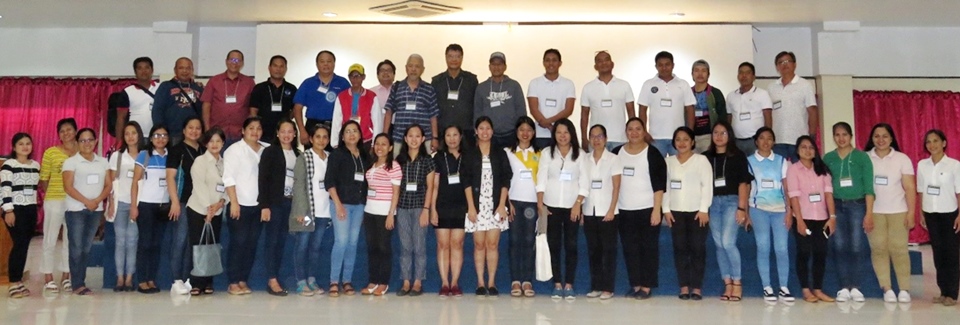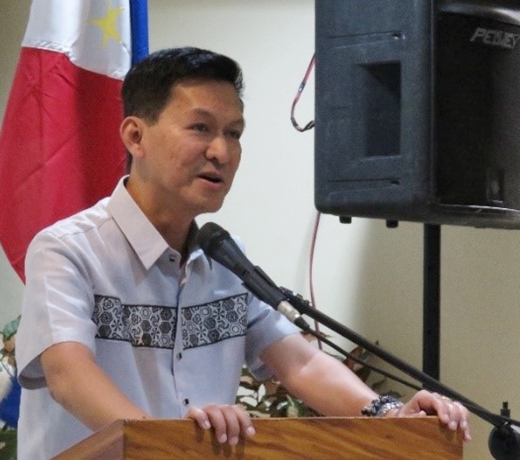 Dr. Edgardo E. Tulin, President of the Visayas State University, delivered the opening remarks and welcomed the participants.The workshop served as a common venue for collectively sharing the accomplishments, lessons learned, and experiences viewed from the different perspectives and manner of engagement of stakeholders in implementing the ISARD program in the two pilot sites, namely: Victoria, Oriental Mindoro; and Inopacan, Leyte. Twenty-nine participants representing the partner academe, local government units, and national government agencies attended the event. Dr. Edgardo E. Tulin, VSU President, welcomed the participants and encouraged them to take the opportunity to share and learn from the experiences of each site. He commended the project for contributing in directing research, development, and extension (RDE) initiatives of VSU and other stakeholder agencies at the grassroots level.
Dr. Edgardo E. Tulin, President of the Visayas State University, delivered the opening remarks and welcomed the participants.The workshop served as a common venue for collectively sharing the accomplishments, lessons learned, and experiences viewed from the different perspectives and manner of engagement of stakeholders in implementing the ISARD program in the two pilot sites, namely: Victoria, Oriental Mindoro; and Inopacan, Leyte. Twenty-nine participants representing the partner academe, local government units, and national government agencies attended the event. Dr. Edgardo E. Tulin, VSU President, welcomed the participants and encouraged them to take the opportunity to share and learn from the experiences of each site. He commended the project for contributing in directing research, development, and extension (RDE) initiatives of VSU and other stakeholder agencies at the grassroots level.
Dr. Jose R. Medina, ISARD Overall Program Coordinator, gave the workshop overview and emphasized the importance of gathering the stakeholders to draw their insights, suggestions, and inputs that will aid in the assessment and improvement of the program through a participatory approach.
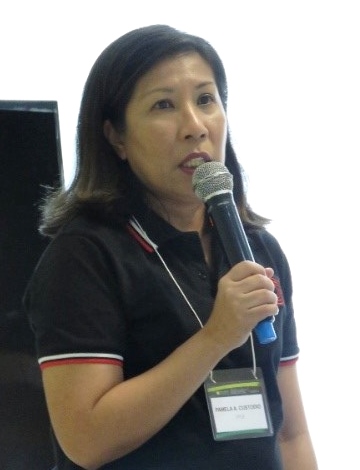 Dr. Pamela A. Custodio, Assistant Professor 5 from the UPLB-CDC, presented the highlights and progress of the case study focusing on learning organizations.Dr. Pamela A. Custodio, Assistant Professor V, College of Development Communication, University of the Philippines Los Baños (UPLB), highlighted the dynamics of the "learning organizations" as a crucial factor in project sustainability. She added that the farmer-beneficiaries' social and organizational processes are among the internal drivers of success in achieving the desired outcomes of ISARD and sustaining what the project has started.
Dr. Pamela A. Custodio, Assistant Professor 5 from the UPLB-CDC, presented the highlights and progress of the case study focusing on learning organizations.Dr. Pamela A. Custodio, Assistant Professor V, College of Development Communication, University of the Philippines Los Baños (UPLB), highlighted the dynamics of the "learning organizations" as a crucial factor in project sustainability. She added that the farmer-beneficiaries' social and organizational processes are among the internal drivers of success in achieving the desired outcomes of ISARD and sustaining what the project has started.
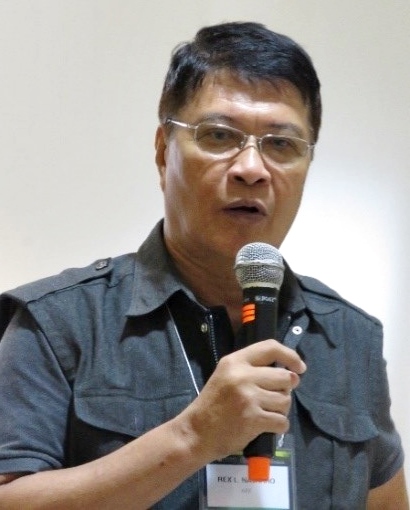 Dr. Rex L. Navarro, Overall Workshop Facilitator, explained the workshop mechanics, guide questions, and expected outputs to the participants.Prior to the workshop proper, Dr. Rex Navarro, the workshop's overall facilitator, led the participating groups by providing the set of guidelines, questions and required outputs from each group. Selected representatives from VSU and the Agricultural Training Institute – Regional Training Center 8 (ATI-RTC 8) assumed the facilitative and administrative roles in the participatory group discussions. They likewise processed and presented the group's outputs, which include the project's significant contributions to farmers' livelihoods, partnerships and linkages with national agencies and academic institutions, some gaps and opportunities, and recommendations and proposed corrective measures for ensuring sustainability of interventions in each pilot site.
Dr. Rex L. Navarro, Overall Workshop Facilitator, explained the workshop mechanics, guide questions, and expected outputs to the participants.Prior to the workshop proper, Dr. Rex Navarro, the workshop's overall facilitator, led the participating groups by providing the set of guidelines, questions and required outputs from each group. Selected representatives from VSU and the Agricultural Training Institute – Regional Training Center 8 (ATI-RTC 8) assumed the facilitative and administrative roles in the participatory group discussions. They likewise processed and presented the group's outputs, which include the project's significant contributions to farmers' livelihoods, partnerships and linkages with national agencies and academic institutions, some gaps and opportunities, and recommendations and proposed corrective measures for ensuring sustainability of interventions in each pilot site.
Dr. Jose L. Bacusmo, on-site project coordinator for Leyte, outlined the following recommendations based on the gaps identified for the multi-commodity project: (1) strengthen the organizational capacities of farmers, (2) produce local service providers through intensive technical trainings, (3) build institutional partnerships to solicit funding and acquire necessary support services, (4) document success stories to encourage farmers, and (5) establish new learning sites.
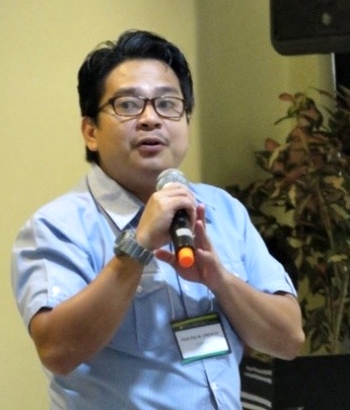 Dr. Pedcris M. Orencio, SEARCA’s Program Head for Research and Development, emphasized the essential elements of the ISARD framework and upscaling mechanismsMeanwhile, Dr. Ma. Concepcion L. Mores, on-site project coordinator for Mindoro, determined strategies and corresponding activities that can be pursued by the Victoria Kalamansi Farmers Federation (VKFF) in managing their commodity-based enterprise. Their team will work further on the following areas: (1) on-farm trials on off-season production technologies, and pest and disease management; (2) capacity building on organizational management, financial literacy, business development, and competency; (3) product enhancement and promotion; (4) market support and expansion; (5) farmer-led immersion projects; and (6) agri-information platforms.
Dr. Pedcris M. Orencio, SEARCA’s Program Head for Research and Development, emphasized the essential elements of the ISARD framework and upscaling mechanismsMeanwhile, Dr. Ma. Concepcion L. Mores, on-site project coordinator for Mindoro, determined strategies and corresponding activities that can be pursued by the Victoria Kalamansi Farmers Federation (VKFF) in managing their commodity-based enterprise. Their team will work further on the following areas: (1) on-farm trials on off-season production technologies, and pest and disease management; (2) capacity building on organizational management, financial literacy, business development, and competency; (3) product enhancement and promotion; (4) market support and expansion; (5) farmer-led immersion projects; and (6) agri-information platforms.
Dr. Pedcris M. Orencio, Program Head of SEARCA's Research and Development, apart from reflecting on the next steps and way forward plan, advised the sites to capture the essential elements from the ISARD framework that contributed to agricultural development activities and document their experiences for shaping the mechanisms for upscaling this not only in the Philippines but in the region. SEARCA was also represented by Ms. Rochella B. Lapitan and Ms. Patricia Ann A. Pielago, Program Support Staff and Project Assistant, respectively, both from Research and Development. (Patricia Ann A. Pielago)
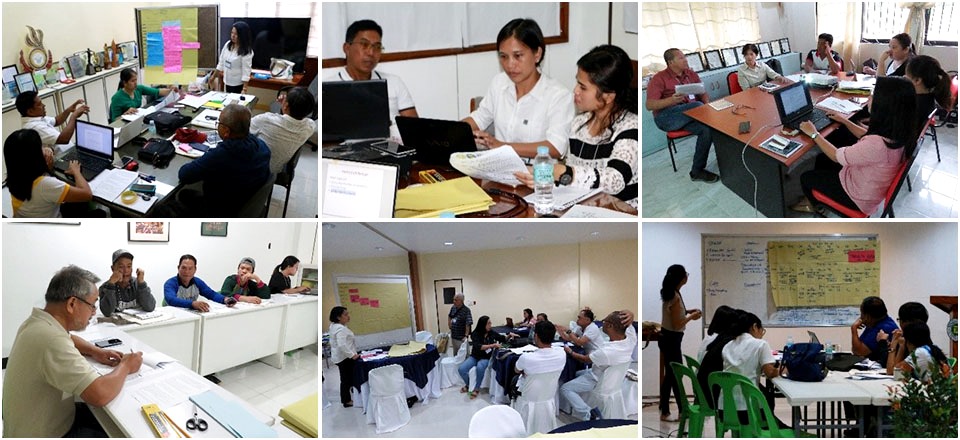 Participating groups of farmers, local government units, and stakeholder agencies from Victoria, Oriental Mindoro (1st row) and Inopacan, Leyte (2nd row) worked on their respective outputs.
Participating groups of farmers, local government units, and stakeholder agencies from Victoria, Oriental Mindoro (1st row) and Inopacan, Leyte (2nd row) worked on their respective outputs.
